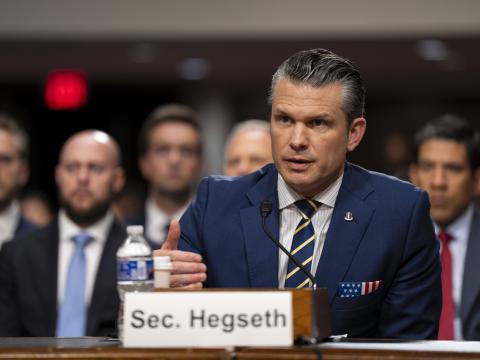Homeland Security Aims for Balance
Wartime always is a period of increased vigilance on the home front. The six-year-old Global War on Terrorism is no exception, but the asymmetrical nature of that war has changed the rules. Instead of a clearly defined, finite process, this war offers a long-term presence that literally may have no designated end. Everyday lives go on as planned, but the conflict continues unabated. This is all the more contradictory considering that the home front is the battlefield of choice for the enemy.
Nations that have had the experience of vast armies crossing their soil, pausing only to wage thunderous battles, can understand well how war can be brought home. But nations that have served as battlefields know that it is a temporary situation. Someday the armies will depart; peace will return; and citizens can assume normal lives in a postwar environment—at least, in history.
The Global War on Terrorism is unique in that it has no clearly defined battlespace or time frame. Cyberspace and global transportation have rendered distances and even borders largely obsolete. The nihilistic nature of al-Qaida and its supporters eliminates the possibility of both sides reaching a political solution. Nor is there a geophysical objective to be taken in this war.
Instead, those on the home front/front lines go about their lives in as normal a manner as possible. Except for some added security measures in key areas, the day-to-day routines of people in the Free World are not on a war footing. The sacrifices that characterized the home front in World War II are absent from the
This defines the dichotomy of homeland security in the 21st century. While the Free World currently is battling al-Qaida in
So homeland security efforts must strike a balance between ensuring the safety of freedom-loving peoples and implementing draconian measures that do more harm to society than a single act of terrorism. One way that a terrorist group can turn people against their own society is to provoke governments into measures that arouse the ire of the citizenry.
And these terrorists have demonstrated that they do not lack imagination. The Global War on Terrorism may be the first war that is defined almost entirely by asymmetric warfare. The terrorists have built their operations around nontraditional attacks and countermeasures. They are breaking the rules almost as soon as they rewrite them. When a force seeks not gain but destruction, it is easy for it to wage war innovatively. It need not plan for a postwar future.
So Free World governments have their work cut out for them. They must institute homeland security measures that preserve the fabric of society without altering it significantly. They must strike at terrorists’ infrastructures overseas to keep the enemy off balance and prevent future attacks. And, they must think ahead of terrorists that have institutionalized innovative evil.
More than two centuries ago, John Philpot Curran warned that eternal vigilance is a condition of liberty. That never has been more valid than today, when terrorists wielding weapons of mass destruction threaten to deprive innocents of both their freedom and their lives. Governments are implementing measures to prevent and deter attacks, and they must continue to work cooperatively with the citizens they serve. There is no reason to give the terrorists another victory.
—The Editor
More information about Homeland Security is available in the February 2008 issue of SIGNAL Magazine, in the mail to AFCEA members and subscribers February 1, 2008. For information about purchasing this issue, joining AFCEA or subscribing to SIGNAL, contact AFCEA Member Services.




Comments